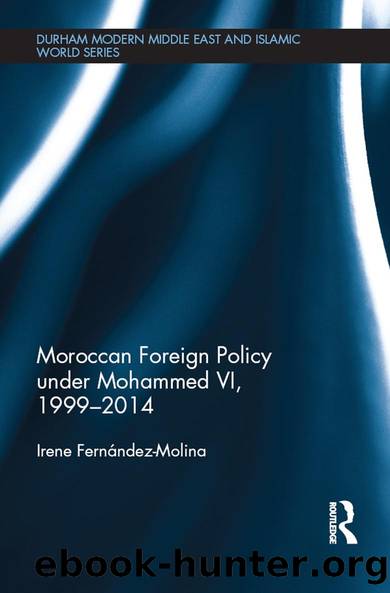Moroccan Foreign Policy under Mohammed VI, 1999-2014 by Irene Fernandez-Molina

Author:Irene Fernandez-Molina [Fernandez-Molina, Irene]
Language: eng
Format: epub
Tags: Social Science, Regional Studies
ISBN: 9781317634232
Google: ucnMCgAAQBAJ
Publisher: Routledge
Published: 2015-10-23T05:59:48+00:00
Steering the Union for the Mediterranean towards Moroccoâs preferences
On the multilateral level, in 2007â2008 discussions and bargaining around Euro-Mediterranean relations concentrated on the gestation of the new UfM, which was for a long time largely a label in search of content. This was a distinctly French initiative which was driven and monopolised by Paris until the European Council adopted it in March 2008, and it was officially launched in July of that year. The original idea was presented by President Nicolas Sarkozy in a speech in Tangier in October 2007 in which he advocated the construction of âconcrete solidaritiesâ among the countries bordering the Mediterranean, that is, an essentially âpragmaticâ and âvariable-geometryâ âunion of projectsâ aiming at remedying the inadequacies of the EMP â yet not necessarily replacing it (speech by Nicolas Sarkozy, Tangier, 23 October 2007). However, this groundbreaking French proposal faced major resistance from the non-Mediterranean EU member states, which were initially excluded from the plan â chief among them Germany â as well as the European Commission. It ended up being redressed and âEuropeanisedâ, with the EU institutions maintaining their role, the EMP acquis being preserved and membership expanded to include all the EU countries (Gillespie, 2011; Soler, 2008: 10â12).
In spite of the attempt to channel Sarkozyâs activism towards reinforcing previously existing Euro-Mediterranean policies, in the end the UfM entailed more change than continuity with regard to the EMP. It pointed in a new direction since it involved at the same time: a shift from region building multilateralism to intergovernmentalism in decision-making; a functionalist and economistic thrust as regards policy priorities; and a more ambitious institutional structure aimed at ensuring north-south âco-ownershipâ as a distinctive feature (Bicchi and Gillespie, 2012: 1â17; Gillespie, 2011). The coming-out of the UfM occurred at the summit of heads of state and government of European and southern Mediterranean countries held in Paris on 13 July 2008, under the French presidency of the EU. The 43 leaders attending approved a joint statement in line with the spirit of the Barcelona Process, while selecting the six pioneering projects on which the activity of UfM was subsequently to be focused, specifically in the fields of infrastructure (maritime and land highways), higher education (Euro-Mediterranean University), environment (de-pollution of the Mediterranean), energy (solar plan), investments (support for small and medium-sized enterprises) and civil protection. Leaving aside this functional self-limitation, the major novelties in the UfM were institutional, including the regular holding of high-level summits, the establishment of a rotating co-Presidency by a northern and a southern country, and the creation of a permanent âtechnicalâ Secretariat.
After the initial momentum, however, doubts about the UfM resurfaced due to the perceived âmismatch between the voluntarist rhetoric displayed during the launch of the project and the effective political content which the project-based approach entailsâ (Jaidi and Abouyoub, 2008: 4). Other criticisms questioned the feasibility â or desirability â of the aim of pragmatically circumventing the most politically pressing problems of the region, such as persisting conflicts and authoritarianism, and the dilution of the EMPâs timid democratic conditionality.
Download
This site does not store any files on its server. We only index and link to content provided by other sites. Please contact the content providers to delete copyright contents if any and email us, we'll remove relevant links or contents immediately.
| Arms Control | Diplomacy |
| Security | Trades & Tariffs |
| Treaties | African |
| Asian | Australian & Oceanian |
| Canadian | Caribbean & Latin American |
| European | Middle Eastern |
| Russian & Former Soviet Union |
The Secret History by Donna Tartt(19052)
The Social Justice Warrior Handbook by Lisa De Pasquale(12187)
Thirteen Reasons Why by Jay Asher(8893)
This Is How You Lose Her by Junot Diaz(6877)
Weapons of Math Destruction by Cathy O'Neil(6264)
Zero to One by Peter Thiel(5786)
Beartown by Fredrik Backman(5737)
The Myth of the Strong Leader by Archie Brown(5499)
The Fire Next Time by James Baldwin(5431)
How Democracies Die by Steven Levitsky & Daniel Ziblatt(5215)
Promise Me, Dad by Joe Biden(5141)
Stone's Rules by Roger Stone(5081)
A Higher Loyalty: Truth, Lies, and Leadership by James Comey(4954)
100 Deadly Skills by Clint Emerson(4921)
Rise and Kill First by Ronen Bergman(4779)
Secrecy World by Jake Bernstein(4741)
The David Icke Guide to the Global Conspiracy (and how to end it) by David Icke(4701)
The Farm by Tom Rob Smith(4502)
The Doomsday Machine by Daniel Ellsberg(4484)
